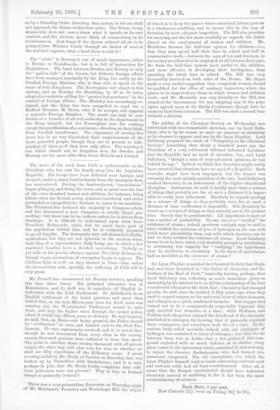The jubilee of the Chemical Society on Wednesday was celebrated
with two remarkable speeches, one by Lord Salis- bury, who is by no means so mere an amateur in chemistry as he chooses to appear, and one by Sir Lyon Mayfair. Lord Salisbury proposed the toast of "Prosperity to the Chemical Society," remarking that about a hundred years ago the President of a very celebrated tribunal informed Lavoisier that the Republic had no need of chemists ; but, said Lord Salisbury, "though a man of very advanced opinions, he was behind his age." Indeed, we think that Lavoisier might safely have retorted that chemists have no need of a Republic. Both remarks might have been impugned, but the former was certainly the more plainly mistaken of the two. Lord Salisbury exalted chemistry as an instrument of the higher educational discipline. Astronomy, he said, is hardly more than a science of things that probably are, for at such a distance it is impos- sible to verify your inferences. Similarly he regards geology as a science of things as they probably were, for at such a distance of time verification is impossible. But chemistry he treats as a science of things as they actually are at the present time. Surely that is questionable. All hypothesis is more or less a matter of probability. No one has ever " verified " the existence of atoms ; indeed, spectrum analysis may be said to have verified the existence of jets of hydrogen in the sun with much more plausibility than any with which chemists can be said to have verified the existence of atoms. Lord Salisbury seems to us to have taken very doubtful ground in attributing to astronomy less capacity for " verifying " its hypotheses than he attributes to chemistry. Is the force of gravitation half as doubtful as the existence of atoms ?






































 Previous page
Previous page